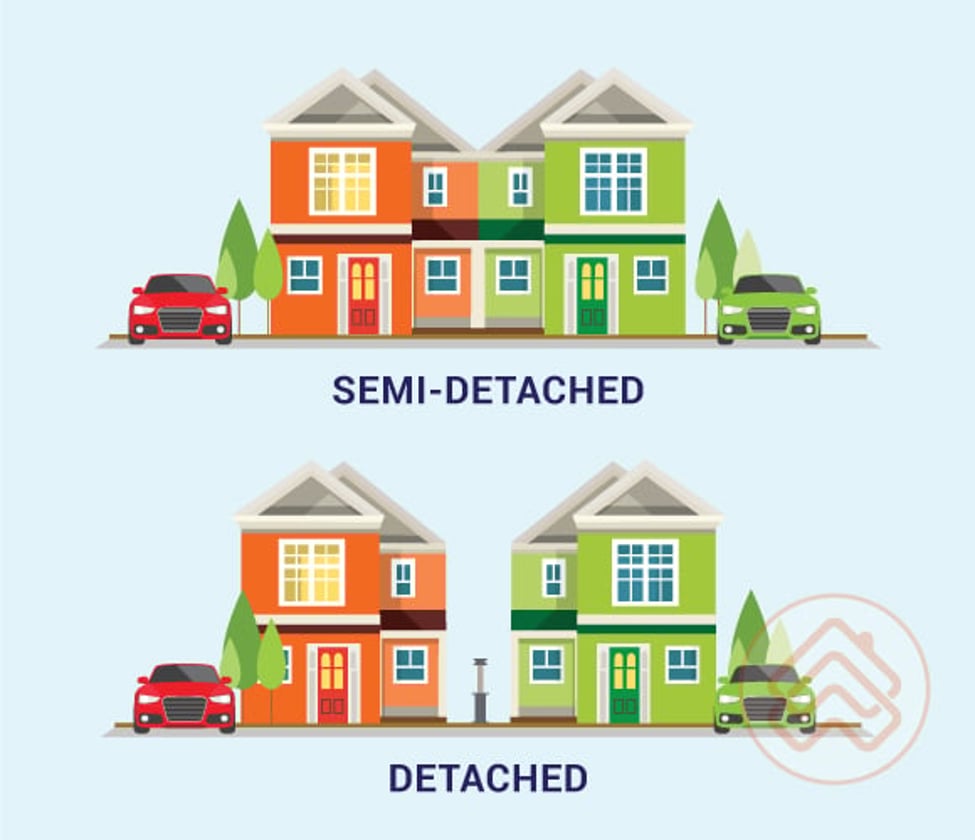If you’re getting serious about buying a home in the GTA but aren’t into the idea of living in a condo or a townhome, that leaves you with two main options: a semi-detached or a detached house. And if you're wondering which one gives you more value for your money, the answer isn't always straightforward.
Both have pros and cons—so let’s walk through them and help you figure out which one actually fits your lifestyle, your budget, and your long-term goals.
First, What Is a Semi-Detached Home?
A semi-detached home is one of two houses that share a single wall. In some cases, they also share garage walls or other structures, but you’re still getting your own front door, backyard, and separate property.
If you’re still torn between renting and buying, you may want to start with our post on that—it covers everything you should consider before committing to either side.
Pros of Buying a Semi-Detached Home
1. Affordability
Semis tend to be more affordable than detached homes in the same neighbourhood. Not only is the upfront cost lower, but you’ll likely spend less on upkeep, renovations, and even utilities. A smaller footprint means smaller bills. That said, a lower purchase price can also mean a lower resale value, so it’s important to keep an eye on how that affects your home equity over time.
2. More space and privacy than a condo
If you’re moving up from a condo, a semi can feel like a major upgrade. You’ll likely get more square footage, a private backyard, and maybe even a front porch—without giving up the convenience of city living.
3. Potential for shared costs
Depending on your relationship with your neighbour, there may be opportunities to split the cost of repairs—like a shared roof or fence—which could save you money in the long run.
Cons of Buying a Semi-Detached Home
1. Sound transfer
You only share one wall, but that wall matters—especially in older homes with poor insulation. You may hear your neighbour’s music, arguments, or renovations, and unfortunately, there’s not much you can do about it.
2. Neighbour reliance
Shared structures mean shared responsibility. If the people next door aren’t keeping up their half—whether that’s the roof, the yard, or the exterior—it can affect your property and your resale value. A leak in their roof could become a leak in your home.
3. Limited curb appeal
Even if your side is beautifully maintained, buyers are going to see the whole house. If your neighbour’s side is in rough shape, it may impact your sale price.
When Does a Semi-Detached Home Make Sense?
The price works for your budget
You want your own outdoor space
It lets you live in a neighbourhood you otherwise couldn’t afford
You’re not planning a big life change (like expanding your family) in the next few years
What Is a Detached Home?
A detached home is a standalone house with no shared walls or structures. It’s your property, fully separated from your neighbours. This option typically offers more freedom—but also comes with more responsibility.
Pros of Buying a Detached Home
1. Maximum privacy
With no shared walls, you won’t be worrying about noise from next door. This is especially appealing if you value peace and quiet, or just want full control of your living space.
2. More freedom to customize
You can renovate, redesign, or upgrade your home however you want—without needing to consider what your changes might look like next to a connected house. This often leads to better curb appeal and potentially stronger resale value.
3. Full control
With no shared maintenance concerns, you’re not dependent on anyone else to keep up appearances or pay their share. You control the timing and quality of repairs, which can help protect your investment over time.
Cons of Buying a Detached Home
1. Higher cost
Detached homes generally cost more to buy, maintain, and insure. They also tend to come with higher property taxes.
2. All maintenance falls on you
There’s no splitting the cost of a new roof or landscaping. Every repair or upgrade comes out of your own pocket.
When Is a Detached Home the Better Fit?
You can afford the higher price and upkeep
You want long-term flexibility or this is your forever home
The home and neighbourhood check all your boxes
So, Which One Has More Value?
Detached homes historically sell for more, but that doesn’t automatically make them the better investment. The real value depends on your priorities—location, condition, lifestyle, future plans, and how long you plan to stay.
A well-maintained semi in a high-demand neighbourhood can perform just as well, especially if you don’t need the extra space or are looking for a more budget-conscious entry into the market.
If you're still unsure which direction to go, check out these related posts:
Buying a Condo in Toronto
What to Know About Leaving the City for the Suburbs
Can You Skip Buying a Starter Home?
Still have questions? Feel free to reach out any time. I’m happy to walk you through your options based on your goals.

